#rochester is a villain
Text
There's a town in Sicily called Bronte, so naturally I now headcanon that Rochester's Italian mistress Giacinta was from there.
#giacinta the mistress#rochester is a villain#not recap#charlotte bronte#jane eyre#hilarious considering charlotte's xenophobia#they've got their kind of pizza there too. i haven't tasted it tho
4 notes
·
View notes
Link
I thought I’d link my mega-post here too. I’m surprised myself at how long it got--clearly I have a lot to say about Jane Eyre.
As it’s coming from me (and obvious from the title) this is not at all flattering to Rochester, so if you like him, do not click the link and read the post. Very pro-Bertha, also redemption for Blanche, Grace and Richard.
0 notes
Text
Husbands I want to slap --


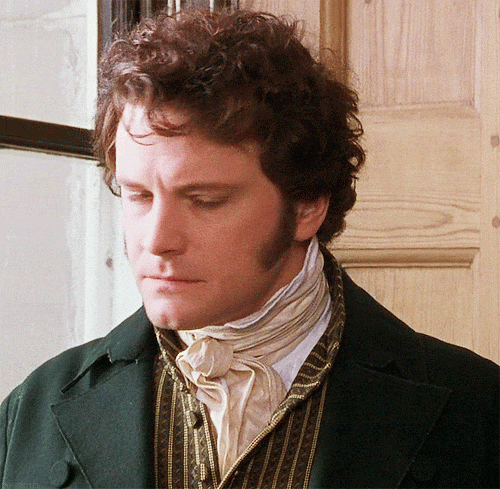



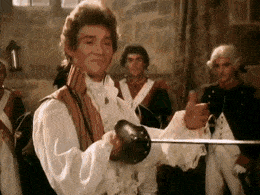





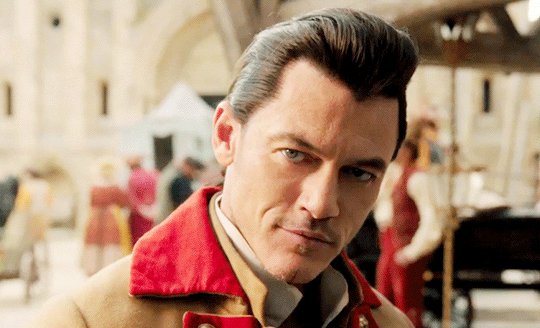
Just because I'm morbidly curious what would happen if I did slap either of these men (knowing I'd probably die)
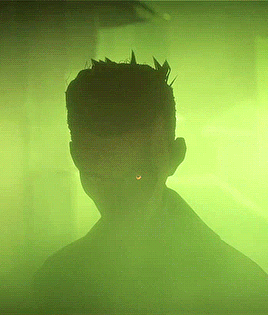
It would have be a left-handed slap, because I'd feel bad about hitting his scars.
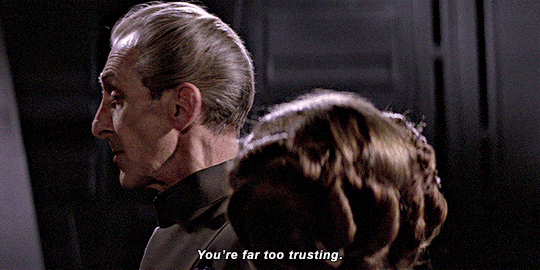
This bitch, however -- Young Wilhuff is just asking for a beating.

Slap fish --- just kidding. I could never touch this sweet baby girl.
#problematic husbands part 4#feral husbands#basil rathbone and every villain he played#scarlet pimpernel#percy blakeney#chauvelin#ian mckellen#anthony andrews#mr darcy#mr rochester#sheriff of nottingham#alan rickman#charles dance#voltron#keith#lotor#rick hunter#macross#gaston#wilhuff tarkin#star wars#silco#arcane#the shape of water#thranduil#rhett butler#clark gable#humphrey bogart
66 notes
·
View notes
Text
i also do think that in jane eyre charlotte bronte intends for jane and bertha AND ROCHESTER to all be sympathetic in their own ways. the only truly outright malicious/evil characters imo are mrs. reed, mr. brocklehurst, and the late mr. rochester senior.
#there are of course bitchy characters like blanche ingram (and st. john rivers) but i wouldn't say they're like truly BAD people#obviously there are MAJOR issues with how bertha is treated by the narrative (especially wrt race and racism)#but i do think we're not supposed to hate her or think of her as like inherently ''inferior''#like idk.....i feel like a lot of what charlotte bronte dislikes and is clearly against in this book is hypocrisy#like jane is always calling people out on hypocrisy (including rochester)#and the most villainous characters are the biggest hypocrites of all#i think that's the true ''evil'' in the book#jane eyre#text
112 notes
·
View notes
Text
everything i’m doing with my life right now is just filling time until i meet my destiny (being locked away in the attic by my husband during my 30s)
#fraise.txt#disclaimer: this is a joke#if you're read jane eyre you know who i'm referring to#i feel bad for bertha ...#i know rochester being the villain is like 40% of secondary criticism on the novel but you know what#maybe i will read l.l. mckinney's book escaping mr. rochester when it comes out#but also charlotte brontë: what the hell
4 notes
·
View notes
Text
i often ponder the dynamics of bertha's family life and every time it makes me sick,,, imagine caring so little for your daughter and her fate that you're fully willing to marry her off to some man who's completely in the dark about her mental health issues & therefore can do just about anything to her if he decides she's even the slightest bit bothersome,, not to mention the fate bertha's mom suffered
#i am by no means a fan of rochester but when it comes to bertha and her story i really don't think he's the main villain#it's bertha's family i have the most beef with#my heart hurts so much for her#bertha mason#jane eyre#L screams about jane eyre
19 notes
·
View notes
Text
I watched Crimson Peak, and while I enjoyed it immensely, I was left dissatisfied. It’s the fundamental problem of writing a gothic novel. The story is driven by women in a world where they have no power, and that rocks. However, it fails to transcend the Madonna/whore dichotomy ever-present in gothic stories. It’s still a compelling watch, and I would recommend it, but I have complicated feelings about it.
The example of the Madonna/whore dichotomy that comes to my mind is Jane Eyre and Rochester’s insane wife, Bertha. Edith and Lucille map onto those characters pretty well. Edith, like Jane, is smart, determined, brave, and willing to face hard truths. Lucille, like Bertha, has a sexual claim on Edith’s husband, inflicts violence on Edith, was committed to an institution at some point in her life, and at the end, she is portrayed as wild, almost animalistic. “I won’t stop until I kill you or you kill me.”
I actually think Lucille is written as less sympathetic than Bertha is. In Jane Eyre, there’s a clear sense that Bertha is a victim of her circumstances. She is married off to someone she doesn’t know, taken to another country, and locked in an attic with one attendant to keep her company while her husband falls in love with another woman. Lucille, on the other hand, perpetrates her circumstances. She killed their mother, she poisons the brides, she refuses to leave the decaying manor. The movie makes it clear that she is two years older than Thomas, and strongly implies that she initiated the incest when they were children. While she’s not responsible for the abuse they suffered as children, she is the unambiguous villain of the movie.
In contrast, Thomas is allowed to be complicated, and his agency in the circumstances is downplayed or elided. His inventions require the money that they seek out brides and kill for. He chooses the women that his sister will kill. He is in every way as responsible for the violence in the movie as Lucille is, and yet the movie chooses to redeem him. He falls in love with Edith, he spares Alan, he proposes abandoning the manor and the money, and he ultimately saves Edith in the final fight with Lucille. I think this is a good story, but it disappoints me that Lucille is left as pure monster while her partner in crime gets to be complicated.
There are flickers of empathy for Lucille that make me think Guillermo del Toro might like her as much as I do. We get a full explanation of her childhood, so we know why she is the way she is. We learn that she protected her little brother and loved her baby who died. The closing narration of the movie implies that her ghost persists because of love. I just wish she got to heal from her childhood the way Thomas got to. It saddens me to think that her ghost will live on in the same rotten walls that trapped her in life.
9/10 I could talk about this movie for forever
#crimson peak#this isn’t even touching on the gorgeous costumes sets and acting#the whole movie is fucking fab#horror reviews#op
165 notes
·
View notes
Text
C. E. and A. are Charlotte, Emily, and Anne, obviously.
Obviously, Anne is the Brontë who most clearly deconstructs the "bad boy" Romantic hero with her negative portrayal of Arthur Huntingdon in The Tenant of Wildfell Hall. But what about her sisters with Rochester in Jane Eyre and Heathcliff in Wuthering Heights?
I was just reading @burningvelvet's in-depth analysis of the Byronic hero archetype in literature, which @bethanydelleman reblogged. When discussing the Brontës, they concluded that Emily plays the archetype fully straight in Heathcliff, since Heathcliff never changes or redeems himself, while Charlotte partly deconstructs it by playing it straight in Rochester at first but then punishing and redeeming Rochester so that he's no longer Byronic in the end. That's definitely a valid interpretation.
Yet I've also read the argument that Charlotte plays the "romantic bad boy" archetype the straightest, because she makes (or tries to make) Rochester a sympathetic character whom Jane never stops loving and who can redeem himself and become her ideal husband. From this viewpoint, Emily was the one who partly deconstructed the archetype by portraying Heathcliff as an explicitly bad man and an abuser, whose only possible romance is with is the similarly sublime and monstrous Cathy, and whom no ordinary girl like Isabella could ever hope to change. Although her deconstruction doesn't go as far as Anne's (so this argument goes), because she still creates sympathy for him and portrays his passion for Cathy as romantic.
Then of course there's the pop culture idea that both Rochester and Heathcliff are completely straight examples of romanticized Byronic bad boys, while only Anne was "the sensible one" who deconstructed the archetype. As seen in that popular yet (IMHO) slightly unfair Kate Beaton comic that shows both Charlotte and Emily swooning over dark, brooding men to Anne's disconcertion.
Of course the last option is that all three sisters deconstructed the Byronic hero archetype in different ways: Anne by dismissing him altogether, Emily by making him a compelling and tragic villain but still a villain, and Charlotte by punishing and redeeming him.
Which way of reading their work rings the truest to all of you?
#poll#the bronte sisters#charlotte bronte#emily bronte#anne bronte#jane eyre#wuthering heights#the tenant of wildfell hall#byronic hero
77 notes
·
View notes
Text
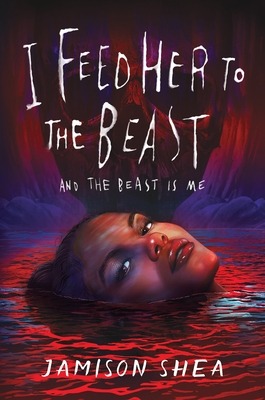
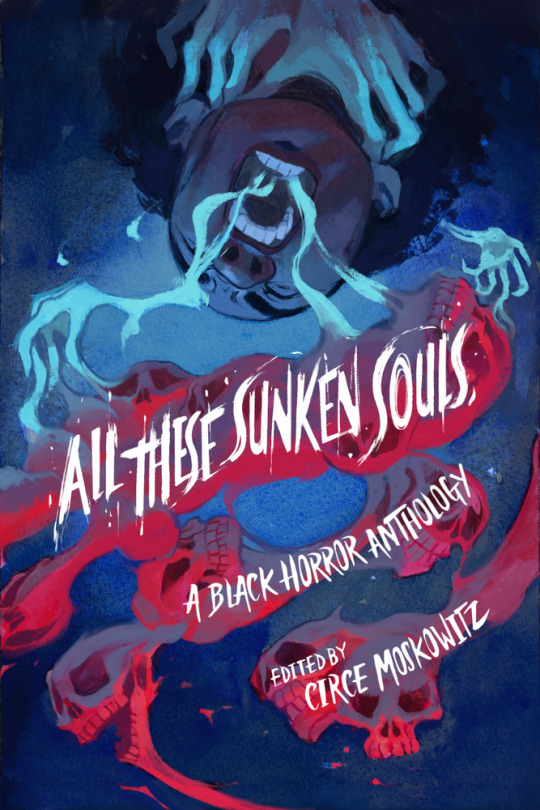
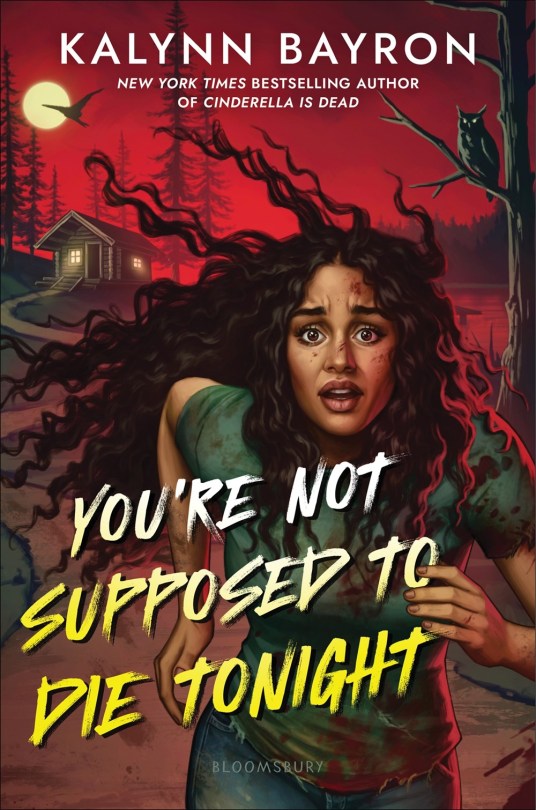
3 YA Black Horror Books for Spooky Season
Now that spooky season is in full swing all around me, it's time to turn to some spinechilling reads. It's been an amazing year for Black horror in YA, from an anthology (out October 17th!) to exciting new books that will keep you up all night long. Here are 3 YA horror books with Black protagonists for you to check out!
I Feed Her to the Beast and the Beast Is Me by Jamison Shea
There will be blood. Ace of Spades meets House of Hollow in this villain origin story. Laure Mesny is a perfectionist with an axe to grind. Despite being constantly overlooked in the elite and cutthroat world of the Parisian ballet, she will do anything to prove that a Black girl can take center stage.
To level the playing field, Laure ventures deep into the depths of the Catacombs and strikes a deal with a pulsating river of blood. The primordial power Laure gains promises influence and adoration, everything she’s dreamed of and worked toward. With retribution on her mind, she surpasses her bitter and privileged peers, leaving broken bodies behind her on her climb to stardom.
But even as undeniable as she is, Laure is not the only monster around. And her vicious desires make her a perfect target for slaughter. As she descends into madness and the mystifying underworld beneath her, she is faced with the ultimate choice: continue to break herself for scraps of validation or succumb to the darkness that wants her exactly as she is—monstrous heart and all. That is, if the god-killer doesn’t catch her first.
From debut author Jamison Shea comes I Feed Her to the Beast and the Beast Is Me, a slow-burn horror that lifts a veil on the institutions that profit on exclusion and the toll of giving everything to a world that will never love you back.
You're Not Supposed to Die Tonight by Kalynn Bayron
At Camp Mirror Lake, terror is the name of the game . . . but can you survive the night? This heart-pounding slasher by New York Times bestselling author Kalynn Bayron is perfect for fans of Fear Street.
Charity Curtis has the summer job of her dreams, playing the “final girl” at Camp Mirror Lake. Guests pay to be scared in this full-contact terror game, as Charity and her summer crew recreate scenes from a classic slasher film, Curse of Camp Mirror Lake. The more realistic the fear, the better for business.
But the last weekend of the season, Charity's co-workers begin disappearing. And when one ends up dead, Charity's role as the final girl suddenly becomes all too real. If Charity and her girlfriend Bezi hope to survive the night, they'll need figure out what this killer is after. Is there is more to the story of Mirror Lake and its dangerous past than Charity ever suspected?
All These Sunken Souls: A Black Horror Anthology by Circe Moskowitz (Anthology editor) -- Out on October 17th!
Welcome to the Dark. We are all familiar with tropes of the horror genre: slasher and victims, demon and the possessed. Bloody screams, haunted visions, and the peddler of wares we aren’t sure we can trust. In this young adult horror anthology, fans of Jordan Peele, Lovecraft Country, and Horror Noire will get a little bit of everything they love—and a lot of what they fear—through a twisted blend of horror lenses, from the thoughtful to the terrifying.
From haunted, hungry Victorian mansions, temporal monster–infested asylums, and ravaging zombie apocalypses, to southern gothic hoodoo practitioners and cursed patriarchs in search of Black Excellence, All These Sunken Souls features the chilling creations of acclaimed bestsellers and hot new talents, with stories from Kalynn Bayron, Donyae Coles, Ryan Douglass, Sami Ellis, Brent Lambert, Ashia Monet, Circe Moskowitz, Joel Rochester, Liselle Sambury, and Joelle Wellington.
#i feed her to the beast and the beast is me#you're not supposed to die tonight#all these sunken souls#black horror#ya lit
59 notes
·
View notes
Note
Trey: *Trying to explain Riddle is that way because of his mom*
Me: Give me a minute as I pull up my ‘Trauma Doesn’t Excuse Sh*t Behavior’ PowerPoint.
Say it with me, everyone: an explanation is not an excuse 😊
You know, the other day I was watching one of Ryan George's Pitch Meetings and when Producer Guy asked Writer Guy how the audience would root for the villain of the franchise and the response was "he's handsome" which basically explains most people's reactions to fictional men.
Prepare for incoming rant that has little to do with the ask
This probably might come as a shock because one of the main appeal of twst would be the whole villainous aspect/Disney Villain fanbase but I don't really like villains that much, at least, not romantically. Like don't get me wrong, I think that they're incredible characters and it would be so fun to sit down with one and have a conversation with one. Villain songs are so fun (I was literally singing ‘This Day Aria’ to myself the other day I haven’t heard that song in like a decade) and you can tell that that characters like Scar or Hades or Shere Khan or Jafar or Maleficent are having so much fun being deliciously evil and even the more serious, complex ones like Loki or Frollo are fun to pick apart so yeah I understand the hype. I just always rooted for the heroes and I guess heroic characters have always been more my type.
My mother absolutely loves Erik Destler and is forever salty that Christine chose Raoul (despite my many many attempts at arguing why Raoulstine is the superior couple - smol primary school me could not understand why my mum liked the chandelier dropper and was deeply concerned), my best friend has been in love with Heathcliffe since we were eleven, and my little sister has literally told me that her type of fictional men are the toxic red flags (not exactly word for word but she did explain why she likes bad boys over good boys when I was complaining about how my type (wholesome soft boys) always get sidelined for the arrogant, snarky bad boys - we're also very diametrically opposed on our views of friends to lovers (my s++ tier all time favourite and her loathing) vs enemies to lovers (I can't really stand it - Pride and Prejudice is the only exception - and that's literally all she consumes) so that might also be a reason).
Like, I understand the appeal of a Byronic hero (Mr Darcy has far too much power) - a closed off, broody man that hates everything but you? And will burn down the world to keep you warm? I can respect that there are people who dig that. But their not really for me.
The mild bout of insanity thirteen year old me had where I spent two months attracted to Edward Rochester is an outlier and should not have been counted (though that was during my wattpad phase so...)
But I can admit that I have yet to shake off my feelings for Dr Henry Jekyll, Victor Frankenstein and Dorian Gray (though to be fair, Mr Gabriel John Utterson the lawyer and cinnamon roll artist boy Basil Hallward do own my heart). And yes, Jeremy Jordan did make me question my morality as he did make my feelings for Light Yagami be too positive to be sane for a brief moment (Touta Matsuda is still my man, don't worry). But apart from them, literally all of my faves are what you'd call your traditional, morally upright heroes.
Basically what I'm saying is that my perception might be skewed because I've never had the whole 'villains are cooler' mindset when it came to stories. Yes, I love the villains as characters but I always liked their heroic foils more (goodness is just so attractive to me). You get lots of amazing heroic protagonists that have horribly tragic backstories and they're the ones I always fall for because the idea of being a kind sweetheart despite the world being anything but is just *chef's kiss* that's a kind of strength that's so swoon-worthy.
I guess that's why it's harder for me to look past the characters' actions in twst is because, well, they chose to do everything they did. They made a conscious choice to be terrible, despite understanding the consequences. Riddle may have been brainwashed into becoming a tyrant by his mother but he still admitted that he knew he was being horrible - he understands the concept of morality, of good and bad, and he willingly and deliberately did everything he did.
I suppose this text post I found on Pinterest would explain my point better:
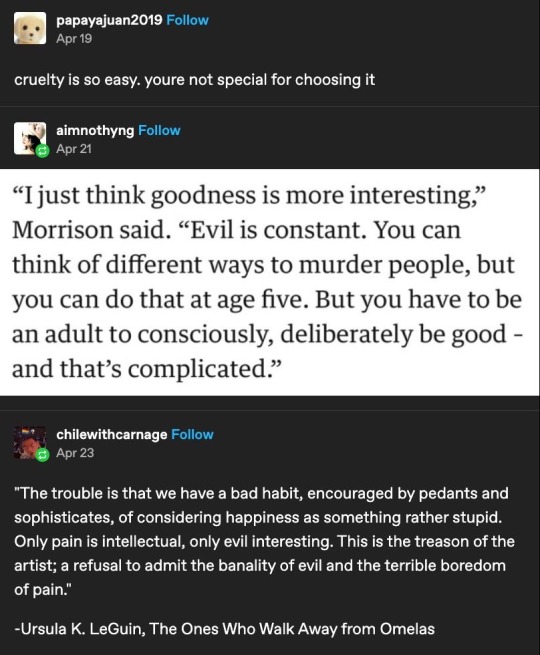
19 notes
·
View notes
Note
🌻
I almost missed this one!!
I'm a big fan of all kinds of gothic romances, absolutely morally bankrupt characters (and the fucked up ways they might fall in love or lust or obsession or something in between), villains and foes and psychosexual nightmares, all that good stuff. I do not believe fiction needs to be moral or didactic in this respect. I say this as a preface to what I have to say next because I think it's a genuinely unpopular opinion:
This is an Edward Rochester hate zone.
I cannot abide this man. I hated him when I was thirteen, and I hate him at twenty-five. (I believe I once wrote "he should have gotten crispy in that fire" in some free reading assignment or other.) His Byronicisms all fall just in the wrong way for me, in large part because they are gross in a way that feels painfully real that isn't fun to read about, and they aren't tempered by any traits to recommend him. I find him not at all interesting and entirely unsympathetic. The only time I ever liked him was when he was doing the most with the drag act, but even then that was pretty loaded.
This all makes him a realistic jerk so he is perhaps well-constructed and well-written, but I for the life of me have never gotten the appeal of this dickwad. He's so mired in his own privilege and unearned self-pity that I genuinely find him to be insufferable. This is a bit bizarre to me as I have adored characters who have done objectively far worse and behaved far more cruelly and violently than he ever did, but again, as asserted earlier - I can get into an awful person being awful if they're doing so in a way that's interesting to witness, and/or if this is balanced out by humanizing elements. Heathcliff abuses women and children and kills innocent animals and he's still intensely sympathetic. Sweeney Todd did all of that and I feel for his plight and love his wry sense of humour and capacity for deep love. The Vampire Chronicles' entire thesis is that even the truly monstrous among us are made human by their ability to connect to art and to one another. To clarify, I know that a character need not have suffered/had a tragic backstory to be sympathetic or interesting just as people we know don't require xyz to be deserving of compassion (for instance I enjoy Dracula being The Worst because he's interesting, he's irredeemable with some zazz), but in terms of what he feels and how he acts, I cannot find any avenue for this connection to come in. I know that it's not uncommon as a modern reader to feel horror for Bertha Mason rather than at her (and it's not '''purity culture"/Puriteens/whatever paper skinned English majors are coming up with now to dismiss any critical discussion of books they like to feel this way!), and this plays a large part in my reading, but he's also cruel and dehumanizing to Jane in a way that feels very much like a Victorian era equivalent of negging/overpraise, which strikes exactly the wrong nerve in me compared to other destructive romances I've liked. That's not to say that one is more or less realistic than another, and comes down to personal bias, but I feel what I feel, and this is a free opinion sunflower emoji ask lolol.
I understand Jane Eyre and like most of it. I understand what a huge step it was as a protofeminist work, the reversing of the power balance by having him be humbled and reliant on her by the end, the emphasis on Jane's freewill and self-worth in the face of her horrific struggles and turmoil.
I cannot grasp wanting to be around this man for more than five minutes. Truly no judgment to those who get something out of this guy, but I just Don't See It.
#posts that will get me kicked out of gothic literature fandom#i'm interested in hearing people's counterpoints on why they like him#less so in debates on this post lolol#no judgment to anyone on either end of this love you all xoxo
25 notes
·
View notes
Text
Richard Mason
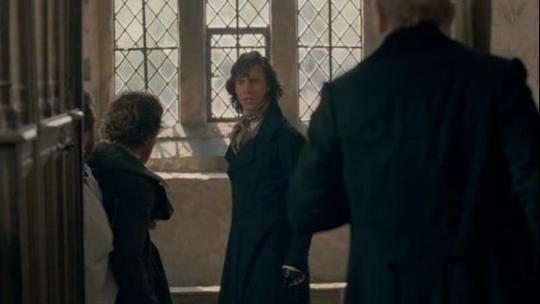
Rochester says this about Richard:
"The elder one [brother], whom you have seen (and whom I cannot hate, whilst I abhor all his kindred, because he has some grains of affection in his feeble mind, shown in the continued interest he takes in his wretched sister, and also in a dog-like attachment he once bore me), will probably be in the same state one day."
Nah. Nothing wrong with Richard. He's just a guy. He's not even feeble minded. He seems to be quite a successful merchant, he's friends with Jane's uncle who we know has made a fortune, and they have to be quite close, otherwise Mr Eyre would not trust him with the important task of stopping the illegal wedding. A person blowing up your dishonest plan does not make them bad or mad, Edward.
Having said that, though. I appreciate the fact that Rochester appreciates the fact that Richard cares about his sister. So you see, I did find something positive about our Edward.
Richard might admittedly be a harder character to redeem than Blanche, but he's lived in my head as one of the good guys for a few years now, so my mind rejects any other idea. I've never disliked him, from my first reading (back in that ancient time known as the 1990s), at worst I'd felt neutral about his character.
Whilst I can argue that Rochester is lying about the circumstances of his marriage to Bertha--based on his previous lies--I can't do the same for Jane's narration. I have to trust her at least to some extent. But what is her narration with regards to Richard Mason? The day he arrives at Thornfield, when the merry company are present, she spends three paragraphs describing his appearance. She rates him as handsome, but thinks him vapid. I can happily dismiss this as Jane justifying herself for loving an ugly man by demonising a handsome one--we know she has tons of baggage regarding beauty. She's trying to listen to the conversation between Richard and the gentlemen--she's intrigued as Richard introduced himself as an old friend of the Roch--but she can't hear much because Mary Ingram and Louisa Eshton sit between her and the men and gush over how handsome Richard is.
Burn them at the stake for it, eh, Jane? Because gods forbid someone else find someone who you don't like attractive...
Where does she even get this from?
His manner was polite; his accent, in speaking, struck me as being somewhat unusual,—not precisely foreign, but still not altogether English: his age might be about Mr. Rochester’s,—between thirty and forty; his complexion was singularly sallow: otherwise he was a fine-looking man, at first sight especially. On closer examination, you detected something in his face that displeased, or rather that failed to please. His features were regular, but too relaxed: his eye was large and well cut, but the life looking out of it was a tame, vacant life—at least so I thought.
Forgive me, Jane, but what you thought means shit to me. (The fuck is a "well cut eye"??? Just one?)
"You detected something in his face"--no, YOU detected whatever you imagined in his face, Jane. Not me. Don't drag the reader into this.
But I liked his physiognomy even less than before: it struck me as being at the same time unsettled and inanimate. His eye wandered, and had no meaning in its wandering: this gave him an odd look, such as I never remembered to have seen. For a handsome and not an unamiable-looking man, he repelled me exceedingly: there was no power in that smooth-skinned face of a full oval shape: no firmness in that aquiline nose and small cherry mouth; there was no thought on the low, even forehead; no command in that blank, brown eye.
This coming from someone who puts Edward Rochester on a pedestal.
"Odd look, such as I never remembered to have seen." She's talking as if she's met thousands of people with thousands of different looks in their eyes, when we know the exact opposite is true. Reminder, item #7 on the list: She has seen nothing of society; the only people she ever had anything to do with were the teachers and pupils at Lowood and the live-in staff at Thornfield Hall. She's not even met any men before Rochester!
What does she want men to look like anyway???
Remember Jane and Rochester's first encounter, when he fell off his horse? Jane could have continued on her way but decided to help him. And the reason she did so was because she could see he was ugly. No kidding, it's right there:
He had a dark face, with stern features and a heavy brow; his eyes and gathered eyebrows looked ireful and thwarted just now; he was past youth, but had not reached middle-age; perhaps he might be thirty-five. I felt no fear of him, and but little shyness. Had he been a handsome, heroic-looking young gentleman, I should not have dared to stand thus questioning him against his will, and offering my services unasked. I had hardly ever seen a handsome youth; never in my life spoken to one. I had a theoretical reverence and homage for beauty, elegance, gallantry, fascination; but had I met those qualities incarnate in masculine shape, I should have known instinctively that they neither had nor could have sympathy with anything in me, and should have shunned them as one would fire, lightning, or anything else that is bright but antipathetic.
Someone get her a therapist.
I'm confident that Jane's descriptions of Richard can be discarded. As for the rest, well what is it that he does that is so wrong? True, he does come across as weak, but nobody is perfect. We don't know what happened in the past, what Rochester did to him to make him fear him. (Edward If-you-won't-listen-to-reason-I'll-try-violence Rochester.) I mean, Briggs has to act like his cheerleader that time in church to get him to speak out. Jane never wonders what makes Richard so afraid of Rochester. To be fair to her, she has other problems at that moment. But, spoiler alert, she doesn't wonder it afterwards, or even think: "well, that makes sense now." Previously, she had seen him in a very vulnerable position--wounded. We're told Bertha is dangerous and violent, so he must have been really seriously wounded, right? Once again, you can't have it both ways. Either the injuries were severe in which case it's understandable he's so shaken, or he's weak and the injuries weren't so severe--but then Bertha is not as dangerous and violent as you try to present her. Personally I think it was more the shock than the injuries.
Like, Jesus. If Bertha is so violent, why the heck does he enter her room unprepared and unarmed?
Actually...
Did Richard even know her husband kept her locked in the attic?
Rochester nearly fainted when he heard of Richard's arrival to Thornfield. By his own admission, he was not afraid that Richard would do him any harm, not intentionally. He tells Jane a chance remark by Richard to one of the guests could destroy him. Basically, Richard could casually slip out that he and Edward are brothers-in-law and that, of course, would mean game over for Eddie-Boy. But... why would Richard say anything? Surely he'd rather keep quiet about having an insane sister? Surely it wouldn't be good for his business if it was known there is madness in his family? So why is Rochester worried?
What are you afraid of, Eddie?
After the gypsy episode, the two men shut themselves in the library. Did Edward concoct a story about Bertha, justifying why he had to keep her under a lock upstairs? Did Richard not buy the story, and, wanting to satisfy himself, go upstairs to check if it's true? Well, he found out, you can say, but that doesn't negate anything that I've been saying on this blog. And he still cares about her. I know I keep saying it, but it needs to be repeated. Even after she attacked him. Even after she, we are told, sucked his blood. That's canon. Not something I made up. Word of God type of canon.
Charlotte shot herself in the foot for writing him that way, making it so easy for me to disprove her own story--but hey, I ain't complaining. Even the wandering look in his face that Jane describes earlier could be explained by Richard's confusion over the absence of his sister in the drawing room. Or just confusion over there being a party at Thornfield in the first place. If Bertha was mad and he knew she was mad and he knew she was locked upstairs, why were all these important people there, and did they know about their host's marriage?
It really is rich of Jane to so confidently assert that there was "no thought in his forehead" and "no meaning in his wandering eye". How the fuck can she know that? SHE'S NOT IN HIS HEAD!!! Why has nobody ever questioned this? Why has no clever academic or scholar, in the 175 years the book has been out ever cast doubt over Jane's claim about what goes inside another person's head, a complete stranger's head at that, someone who has literally just walked in, and who she established might not be a native of England? Why does it take someone with no education past high school and complete ignorance of English literature, whose first language is not English, to notice this???
I like to think that after Bertha's attack, Richard finally realises he needs to get his shit together and get her out of there. He contacts someone of the merry company and asks them for help. Sir George Lynn would be the most useful, obviously, but I also like the idea of him becoming friends with the Ingrams.
I like siblings. I enjoy a good sibling dynamic more than a romance. Especially if it is a brother and a sister. And here I have two pairs to play with (Bertha and Richard, and Blanche and Theodore.)
Isn't writing character developments great?
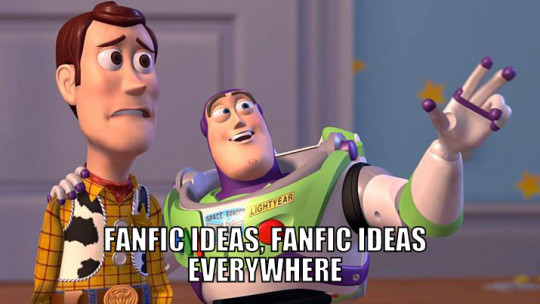
#richard mason#jane eyre#bertha antoinette mason#edward rochester#rochester is a villain#jane eyre meta#bertha mason
10 notes
·
View notes
Text
I think my short story written from the POV of the mad wife, during her very early days in the attic, holds up quite well, if I say so myself. Published on my writing blog rather than AO3.
#writing#mywriting#fanfic#madwoman in the attic#bertha antoinette mason#rochester is a villain#jane eyre#the silver candlestick#actually more pleased with this one than spill the tea#i would never have written this had it not been for the story generator site#it gave me the idea#otherwise i'm not sure if i'd ever have thought about writing her in those early days#i prefer the last days and when she gets out#mypost
0 notes
Note
Are you crushing on Toby Stephens, too? A couple of your posts made me wonder. I’ve added him to my collection of boyfriends after having watched Black Sails. We can thirst together!
I've fancied him for a while--loved loved loved him in Jane Eyre and then ATTWN sealed the deal, even though his character in the latter was quite villainous (then again so is Rochester). He's just so compelling!
8 notes
·
View notes
Text
My Personal Ranking of the Rochesters
Okay, so I absolutely love, love, LOVE the Rochester family. I think they are all tragically underrated characters who deserve more content, so I decided to add some by ranking the members of the Rochester family from my least favorite to my favorite. Spoiler warning for the entirety of Mysteries of the Past, as well as trigger warnings for abuse. So without further ado, let's begin!
10. Malcolm
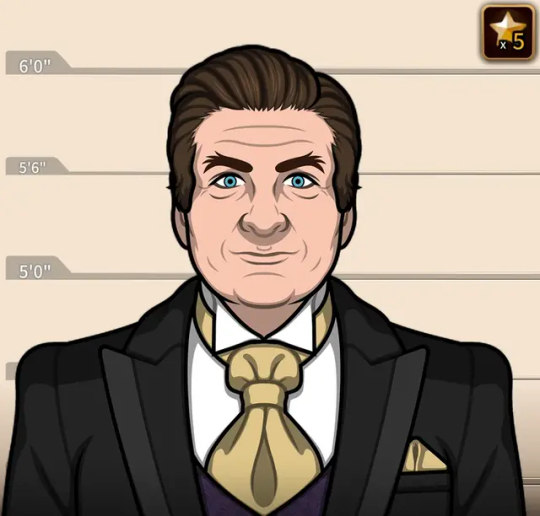
I hate this man so much. Like yeah he’s manipulative and gaslight-y and a threat, BUT he honestly other than that he is just boring. He’s a stereotypical corrupt politician, as well as a terrible, disloyal husband and an even worse, abusive father. While nothing can excuse Archie’s horrible actions in Elysium Fields, I partially blame this mf for how Archie turned out. He’s also SEVERELY underhated, like when people talk about the worst parents in CC this ugly man is somehow left out. Also, he mourns the loss of his job longer than his only child.
9. Rockley
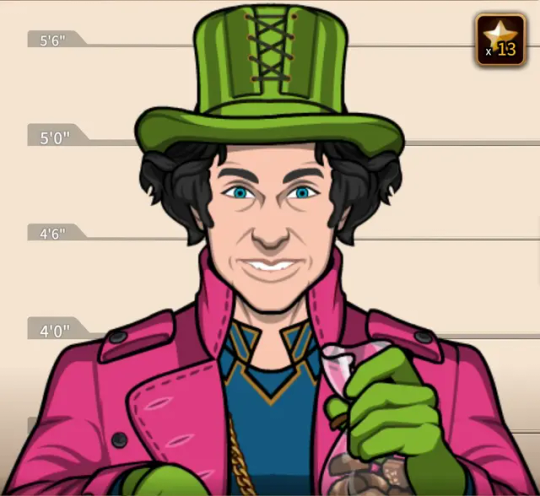
Okay so note there is a HUGE jump in quality between him and Malcolm first of all. Like I think Rockley is fine. He’s like a B tier character for me, mid or lower B but still (Malcolm’s like an F). But unfortunately, Rockley doesn’t really affect the plot that much. Sure, it’s slightly funny to imagine him just running his chocolate factory, minding his own business, as his family kills a bunch of people and does other shady things, but yeah he doesn’t impact the story that much. You could remove him from the game/make him not a Rochester and nothing much would change.
8. Patricia
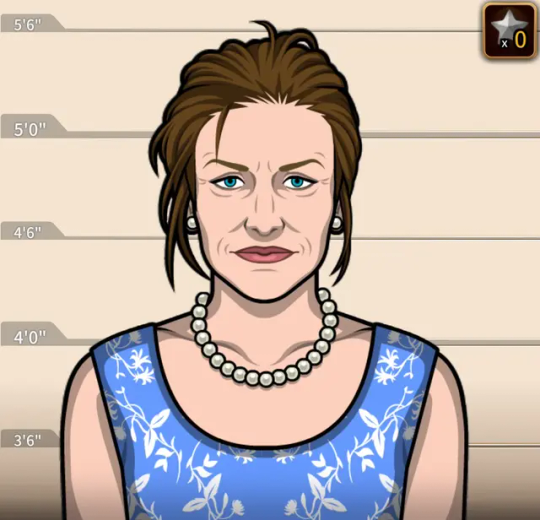
I really wish she was higher up on the list, but sadly, she just doesn’t have that much of a presence because she’s contained to just one district and we just don’t know too much about her life before she married into the Rochester family. It’s worth noting that her fate is HORRIFIC. She was canonically physically abused by Horatio just for the “crime” of standing up to him and calling out his evil behavior, and THEN as if that weren’t enough, she was, while perfectly sane, LOCKED AWAY IN A 19TH CENTURY INSANE ASYLUM WHERE SHE SLOWLY ACTUALLY LOST HER MIND. like goodness gracious. That is a fate worse than death imo. And then while she had the least awful death of any of the Rochesters, she still died. She’s such a tragic character.
7. Clarissa
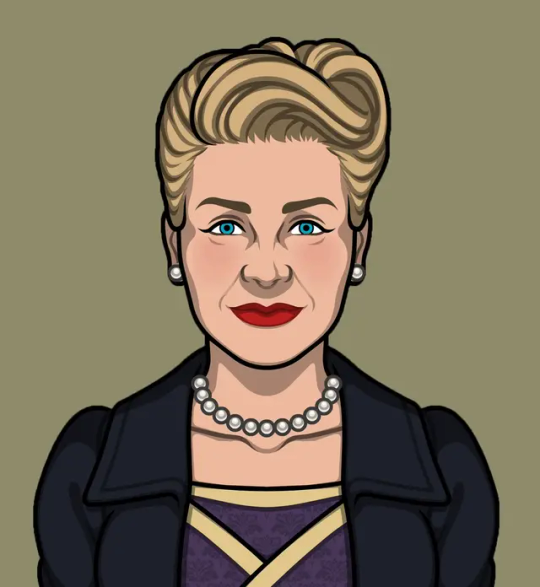
Okay, I know she literally only appeared once as a murder victim, but she still is interesting, even from the little that can be extrapolated from the one case she “appears” in. It seems to me at least that she was in a place of power and comfortable with this and her family's plan to take over the city, but also wanted to help people, such as shown by her wanting to adopt a street kid and her writing a book about financial advice and help. I can honestly see her being a good leader in Concordia, even if yeah, she did benefit from her rivals and critics "disappearing" or having other unfortunate fates.
6. Larry

Okay, I KNOW THAT HE WAS A BAD PERSON, and yes, I have not forgotten what he did to Francine. She was a killer, but she did not deserve that. Obviously, he was selfish and greedy, considering he and Joseph took advantage of hundreds if not thousands of financially desperate people, let his father take the fall for that, and brutally murdered a woman for saying she wasn’t going to let Leopold rot in jail (I’m genuinely surprised that Lawson didn’t give him life). However, he is a good villain. He’s a much better district antagonist than the two before him (I love Giulietta, but Franca and Vittorio are boring characters, sorry). Wolf Street’s my least favorite district in MotP, but Larry is an entertaining villain, a good re-introduction into the Rochester family’s evilness, and it felt good to arrest him. Plus, he has a good design. Classic example of a good character/villain but terrible person.
5. Veronica
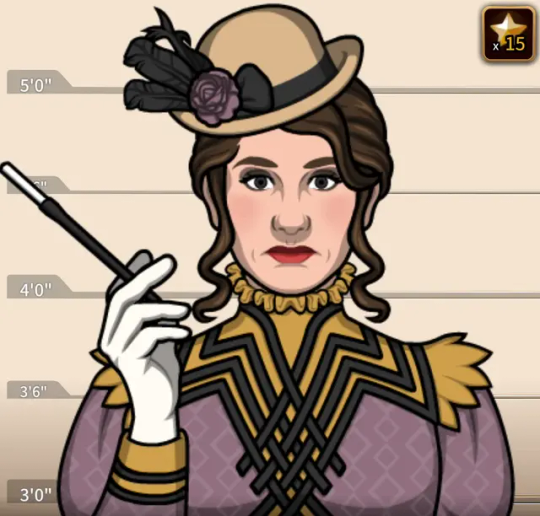
Honestly, Veronica is one of the most wasted Rochesters, and also the only one who we never get closure for. Which is kinda disappointing because I feel like she had a lot of potential, and she does have a lot of hidden tragedy, what with her having Archie when she was only 19 and being in a loveless marriage. But she just mostly seems to be occupied with running her businesses and doing typical things you’d expect a senator’s wife in the 1890s to be doing throughout the game. We don’t get a great glimpse of her relationships with her family, including her son and father, but I certainly have my headcanons about her. She could have been interesting, but she just disappears from the game after the start of Ivory Hill and is never seen or heard from again, even after her son was murdered and her husband arrested. You could take her out of the story and very little would change, too. But I might make a post about some of my headcanons for her, because I want to give her an interesting character the game did not lol
4. Horatio

THIS MF. Horatio is the most evil character in MotP. There is not a shred of genuine compassion for anyone in his body. Yeah, he doesn’t immediately forget about Clarissa after she dies and he’s satisfied with her work, but if she had tried to defy him like his wife and brother, she’d be dead or in the asylum. Horatio was literally connected to half of the game’s problems, even though I do think he gives himself a bit too much credit for stoking the gang war. But the railroad scheme? He collaborated with Vittorio to do that. Every way the Rochesters held power in the game? Him. Making deals with “the devil” in Grim Chapel to dispose of the family rivals? Him. Turning on his own family in an instant if they defied him? He’d do it without hesitation. And the fact that he probably has many, many illegitimate children, too. Point being, Horatio is utterly vile, far more evil than Lawson, the actual main antagonist. But he is a GOOD villain. His motives are clear, he’s ruthless, it feels AWESOME arresting him, and he’s smart. Also, side note, but I’ve got a headcanon that he and Malcolm planned to kill each other once they properly took over Concordia to have the city to themselves. Food for thought.
3. Leopold

Poor Leopold. :( the only beef I got with him is that I think he is a LITTLE too naive. While Bernadine knew very much about her family’s crimes and just tried to ignore them to the best of her ability/didn’t do anything, Leopold genuinely didn’t seem to know, somehow. But he’s a good man through and through, very likable from the start to the end of the game. Therefore, he is a bit of a static character, but that doesn’t change the fact that seriously, he’s such a very kind man. I wish his relationship with his sons was a bit more developed, but even then, there’s a lot to work with in terms of his relationship with his sons. The quote that he has when Larry is arrested and he’s freed, where he talks about how heartbroken he was that Larry was hell-bent on heading to prison really broke my heart. And his unnaturally controlling move of forcing Rockley to be the head of the Bank of Concordia can be seen as a reaction to Larry going to prison and a fear that Rockley could perhaps end up doing the same, hence him dropping a responsibility Rockley didn’t want on him. It’s not a nice move, but it goes to show that while Leopold was a kind man, he was not perfect.
2. Bernadine
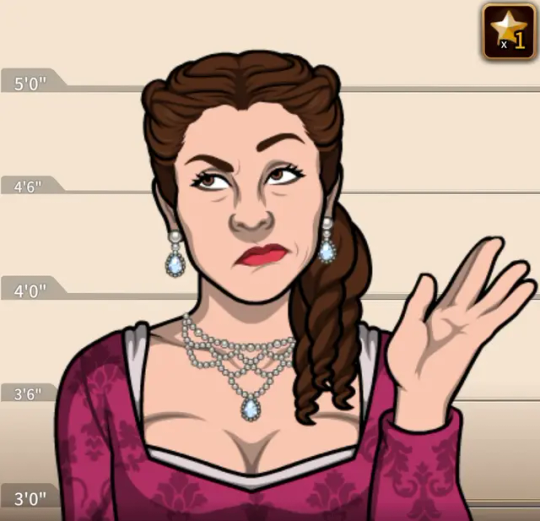
Now we start getting into some of the best characters in MotP! Bernadine’s my fourth fav character in the game, and within my top ten characters in the franchise. Bernadine only is a suspect twice and a quasi-suspect once, but she has a CLEAR character arc. She goes from being a rather haughty, self-important person who I didn’t trust on my first playthrough of the game to an extremely sympathetic character who had to deal with the aftermath of her family self-destructing, and then needing to run for her life from Lawson’s men. A quote I really love of hers is how she says that most of her loved ones dying or being imprisoned is the result of “this family’s mad ambition” and beforehand, said that she always knew the family’s desires to control Concordia would be their downfall. That drives home one of the messages that comes with the Rochesters and their fates--how dangerous unchecked ambition is and how it can destroy the people with it--and A Family Affair really gives some context to her previous behavior. She knew what Malcolm and Horatio were doing, and yet never said anything until asked to spy on Arthur. Don’t get me wrong, I’m not calling her a coward, because the police shouldn’t have had to rely on tip-offs from family members to seriously investigate the Rochesters when their rivals kept disappearing. In fact, she’s brave for standing up to Horatio. She hid behind her mask and watched her family in quiet dread, waiting for the inevitable to happen when they made moves to control the city. And her fears were confirmed. She lost almost everyone she loved, and then immediately had to worry about a dictator wanting to kill her. At least she got a happy ending, and while it would be nice if she appeared more, the game managed to do a lot with just three appearances.
1. Archie
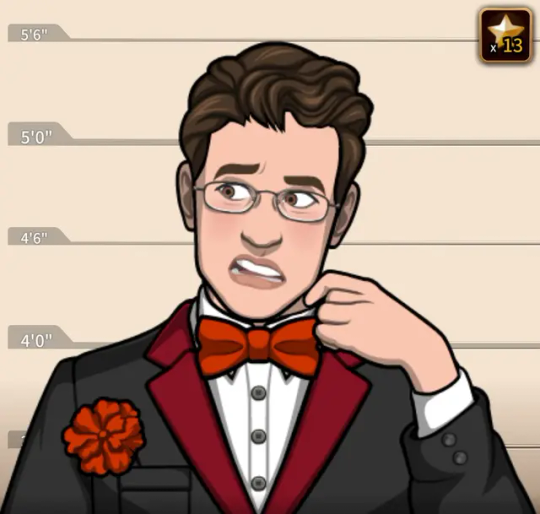
There is genuinely SO MUCH to say about Archie. He deserves a full-blown analysis honestly, he’s my second favorite character in the entire franchise, only after Giulietta (ironic, I am aware). Where to start? He’s an amazing villain, my favorite in MotP. The reasons he became Mr. Alastor are quite sympathetic, considering he was Alastor years before the events of Elysium Fields and became Alastor because he felt out of place and friendless within the elite, saying he was “always poor, sickly, Archie Rochester, no social graces, no friends!” And then he got a power trip from manipulating the very people who he felt rejected him, to the point where he was deluded enough to think that Giulietta would be impressed if her “enemies” died at his parties, leading him to create a (very convoluted, unlikely to work in real life) plan to win her affections. He probably never even had a proper conversation with Giulietta, he just became obsessed with her due to projecting onto her due to them both being outsiders among the elite (and I hc that perhaps he was even projecting his problems with his father onto her due to her own desires to be separate from her father’s reputation). I also love smart villains, and Archie was certainly that, and it makes sense why he thinks that the group of people who rejected him would jump at the chance to commit murder if they and someone they hated were at the same party. And he was right.
And then there’s how he acts when he comes back to Concordia. It’s interesting, because he is not taken seriously by either the game or the police when he returns, despite being treated seriously in Elysium Fields, which communicates that Archie is barely a threat compared to people like Horatio and Malcolm, especially the former. Something else that’s interesting is that Archie thinks he’s able to manipulate people to the point where he puts “gain allies and manipulate people” as an item on his to-do list you find in his desk drawer in Tipping the Scales, and yet he is clearly very easily manipulated, as Diego proves in the AI of Get Off Your High Horse, where he easily manages to get Archie to talk to him and the player literally just by complimenting Archie and saying how smart he is. And there’s how he’s treated by his family, too--ultimately used as a tool to further their political ambitions.
Which brings me to his death, which serves so many purposes. The game says multiple times that he did not to deserve to die, least of all so horrifically, while at the same time making it clear that he was not a good person and had done a LOT of screwed up things in his life (a view that some Criminal Case fans cannot seem to hold in their heads at the same time…), and I’m always a fan of NUANCE like that, being able to acknowledge someone’s brutal death as undeserved while also pointing out the awful things they did in the CC games. Added onto the fact that Tipping the Scales reveals that it’s literally canon that Malcolm is physically abusive to his son, which adds a whole new layer and context to Archie’s very evident issues. And finally, Archie’s death shows just how violent and damaging ambition can be, because in the end, he was one of the final victims of his corrupt family.
I’m sorry if that was a huge infodump about his character, I really love him and need to write a whole analysis of him.
Thanks for reading all of that! Feel free to share your thoughts, too!
#criminal case#criminal case mysteries of the past#mysteries of the past#the rochesters#criminal case game
24 notes
·
View notes
Note
Would you ever write a Jane Eyre retelling/sequel/response?
I ALREADY AM 🥰
one of my current WIPs is a retelling/response that is half from the perspective of richard mason, bertha’s brother!
i am big enough to acknowledge this was partly inspired by how good harry lloyd looked in the mia wasikowska movie (all three minutes of him, bless), and partly because i stumbled upon a series of sequel novels that make him the ACTUAL VILLAIN! are you kidding me! the author of those sequels said she was inspired by COUNT FOSCO AND THE SHAKESPEAREAN RICHARD III for his character! that is WILDLY unfair to him!
i do feel like it’s so easy for people to write him off as a useless coward at best, and actively complicit in what happened to bertha at worst, but there is so little he *could* actually do for bertha (by the time of the events of the novel, anyway) under victorian law, and i just cannot bring myself to believe that richard - who was straight-up stabbed by bertha and still begged rochester to treat her kindly afterward, even when he himself is clearly also terrified of rochester by this point - was ever callous enough to try and get her married off to rochester if he did not think it would at least be maybe, kind of, good for her.
there are so many interesting questions about richard, too: how did he happen to show up at thornfield when he did? had he heard rumors that rochester was courting blanche and wanted to see what was up with that? or, was it pure coincidence that he decided to drop in and visit his brother-in-law at an exact perfect time to make rochester’s life more difficult? how much did he actually know about what rochester was doing to bertha - did he even know she was still *alive* before he saw her for himself? was rochester always as much of an asshole to richard as the way he talks about him to jane suggests? (gonna hazard an almost certainly, yes, on *that* one.)
this is also a what-if retelling/response - the other half is from the perspective of bertha and rochester’s daughter, antoinetta. it is about gothic families; it is about what we owe to our mothers and sisters; it is about eldest sibling syndrome; it is about the generational trauma of being a victorian woman; but, most importantly, it is about how much i dislike edward rochester. lol.
6 notes
·
View notes